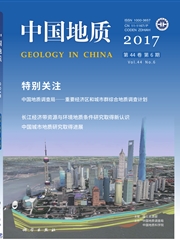

 中文摘要:
中文摘要:
通过对石人山岩块进行系统的矿物学、岩石学特征分析,总结出在洛南-栾川断裂带的影响下,该岩块的变质一变形特征,并阐述其变化规律.石人山岩块的南部边缘发育有一套混合岩带,褶皱强烈,基性岩条带十分清晰.岩石的变质程度由南向北逐渐变浅,从低角闪岩相和角闪岩相的片岩到片麻岩,再到花岗岩,暗色矿物逐渐减少,与花岗岩呈过渡关系:由南向北,随着远离断裂带,岩石结构由碎裂结构向变晶结构-变余结构变化;岩石构造由片状构造向片麻状构造-变余构造变化,变质程度总体是由强变弱、连续的渐变过程;石英的重结晶型式和边界形态、长石变形情况显示:洛南-栾川断裂带和石人山岩块岩石的变质温度范围在300~550℃,属中高温条件;由于后期构造作用的影响,出现温度的非协调现象:动态重结晶石英颗粒边界的分维数为1.332~1.243,从洛南-栾川断裂带往北,随着远离断裂带,呈减小趋势;应变速率值为6.75577×10~(-16)~1.81072×10~(-16),属于中应变速率条件,并且越靠近断裂带应变速率越大.远离断裂带应变速率逐渐减小.
 英文摘要:
英文摘要:
Based on a mineralogical and petrological analysis of the Shiren Mountain block, the authors summed up the deformation-metamorphic characteristics of this block and the regularity of its changes under the influence of the Luonan - Luanchuan faulted belt. A migmatite zone is developed on the southern margin of the Shiren Mountain. In this zone, the rocks have been strongly folded and basite bands can be observed clearly. The metamorphic grade of rocks becomes weak from south to north. From the low amphibolite fades and amphibolite fades schist through gneiss to granite, dark minerals gradually decrease, showing a transitional relationship with granite. From south to north, with the increasing distance from the faulted belt, the rocks change from cataclastic to palimpsest in texture and from sheet to gneissic-palimpsest in structure. Generally, the changes assume a continuous and gradual process from strong to weak. The recrystallization type and boundary shape of quartz and the deformation of feldspar show that the deformation temperatures of the Luonan - Luanchuan faulted belt, the Shirengou Mountain block and the metamorphic rock block vary in the range of 300~550℃, belonging to the middle-high temperature condition. Under the influence of the late tectonic process, there appeared a phenomenon of non -coordination of the temperatures. The fractal dimensions of the dynamically recrystallized quartz grain boundary are in the range of 1.332~1.243 and tend to decrease with the increasing distance from the Luonan -Luanchuan faulted belt northward. Strain rates are in the range of 6.75577E-16 to 1.81072E-16, which belong to the middle strain rate condition. The strain rate and the distance from the fault belt are positively correlated with each other.
 同期刊论文项目
同期刊论文项目
 同项目期刊论文
同项目期刊论文
 期刊信息
期刊信息
